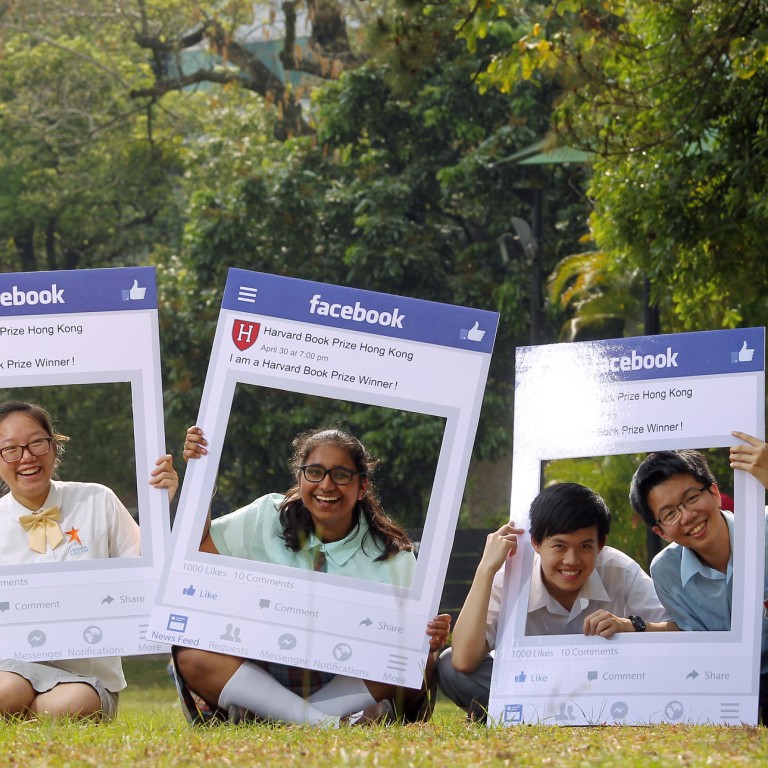
Hong Kong Harvard Book Prize scholarship winners started young
Four winners of HK$110,000 prize all began reading books at an early age
When Ariel Chan Hin-man read the book by American author Ned Vizzini three years ago, it gave her a more positive outlook on life.
Back then, she was a pessimistic teenager who often placed herself in a victim's role when things went wrong.
But this book - about a suicidal teenager who awoke to the fact of his blessed life in a hospital - inspired her to stop finding excuses for not facing up to adversity.
"I realised that using depression as an excuse was a terrible thing. Many people are, in fact, less privileged. The experience caused a 180-degree change in my outlook," says Ariel, a student at Hong Kong University Graduate Association College. She is one of four recipients of the Harvard Book Prize scholarships worth HK$110,000 each. The winners beat more than 110 candidates after rounds of interviews about their aspirations and responses to the impact social networks had on their lives. All contestants were nominated by their schools for their reading habits.
The Harvard Book Prize, set up by university alumni who have formed 180 clubs in 70 countries, has been around for more than 100 years.
The Hong Kong chapter was established in 2005. Traditionally, a book written by a Harvard scholar was offered as the prize. This year's selection is physicist Nicholas Christakis' .
To attract more participants and help students gain overseas experience, this year the local chapter launched the scholarships that cover the cost of studying seven-week, college-level courses at the Harvard Summer School.
Calvin Lee, owner of a private equity fund and co-chair of the Harvard Book Prize Committee of the Harvard Club of Hong Kong, says: "We understand that some people might find it boring to read. We hope this scholarship will encourage students to read more and take the initiative to compete for the prize."
Parental influence plays a big role in nurturing children's interest in books. Chan, whose mother plied her with books on different areas from fiction to arts, is among the lucky ones.
Noticing her interest in arts, Ariel's mother bought her art history books, which further encouraged her self-exploration. Ariel now enjoys expressing creativity through writing, painting and drama.
"My mother has introduced many other channels to me - from libraries to book fairs. She encourages me to reach beyond fiction," she says. "Reading [about arts] has inspired me to engage in more arts activities."
Going through physical books is to her a holistic experience. "Books can give you endless imagination," she says. "When you physically flip through the pages, the smell of the book . . . leaves a more lasting impression than just clicking a button on the computer."
The awardees have another thing in common - they developed a reading habit at an early age.
Sha Tin Methodist College student Chau Tak-huen began flipping through pages for pleasure when he was at kindergarten. His parents advised against playing with the computer or video games, introducing him to sports, crafts and books rather than filling up his time with "expensive interest classes".
With a library at home, he developed the habit of reading a 200-page book per week.

"If I have a choice of either staying idle or reading the books on the shelves, I choose the latter," he says. "Reading also creates personal space for me. I can choose when and where to read."
He will be studying international law and human rights for his summer course, while other winners have opted for journalism and the history of the Middle East.
Lau King-heng, who will study space exploration at the summer school, is a science lover with a huge passion for meteorology. He reads half an hour every night before going to bed, and can finish a book in a day. "My mother borrowed books with all four library cards in my family. That was why I read many books at one time. Many of them were narrative stories. I also read the encyclopedia," says King-heng, a student at Baptist Lui Ming Choi Secondary School.
He particularly enjoys making new discoveries while browsing through library catalogues.
"When I read about outer space in, for example, Wikipedia, I only receive straightforward information about planets and its features," he says. "But looking through library catalogues, I can dig into different levels of knowledge. It is a form of progressive learning which can be more tailored to specific needs and ages."
If I have a choice of either staying idle or reading books, I choose the latter
Similarly, Lee of the Harvard club has his family to thank for helping broaden his perspective through books.
"My brother used to ship me new books from the US when he was studying abroad back in the old days. Fiction and non-fiction, that's how I got started, reading books not covered in the core curriculum in my primary and secondary school."
And it has paid off in his pursuit of further education.
He adds: "Obviously, American universities look for candidates who can think outside the box; reading more and getting exposed to a broader range of books did help me play the game in a smarter way."
Reading a broad range of topics ranging from arts to sciences keeps him connected to what's happening in the world. "It is highly relevant to my job in the fund management field - it helps me generate ideas and identify the next big trend in global economies and investment space."
